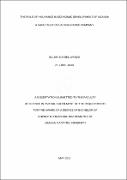| dc.description.abstract | Well as the insurance industry in growing at a tremendous pace across the globe, the insurance industry in Uganda remains very small and with minimal contribution to economic development. According to IRA (2013) the insurance market penetration in Uganda is approximately 0.66% of GDP, which is low even in comparison to other African countries.The purpose of this study was to investigate the effect of insurance on the economic development of Uganda, using UAP insurance as a case study. The objectives of the study were to investigate the effect of non-life insurance on the economic development of Uganda, to assess the impact of health insurance on the economic development of Uganda, to investigate the effect of life assurance on the economic development of Uganda.
According to findings by Grant (2012) about the roles, benefits and capabilities of the insurance industry, the insurance industry is said to manage, diversify and absorb the risks of individuals and companies. Insurance is often considered a precondition for the development of other productive activities, such as acquisition of homes, starting or expanding of business. And in turn these activities do fuel demand, facilitate supply and support trade.
The descriptive research design was used and both qualitative research design and quantitative research design were used to collect data.. The data collected was analyzed using SPSS-19 and was presented using tables and pie charts.
The study also revealed that insurance contributes to economic development of the economy, however, insurance penetration in Uganda was still very low compared to her other East African counterparts. The study recommended more awareness campaigns and sensitization from government and other stakeholders like the IRA, UIA and industrial players. | en_US |


